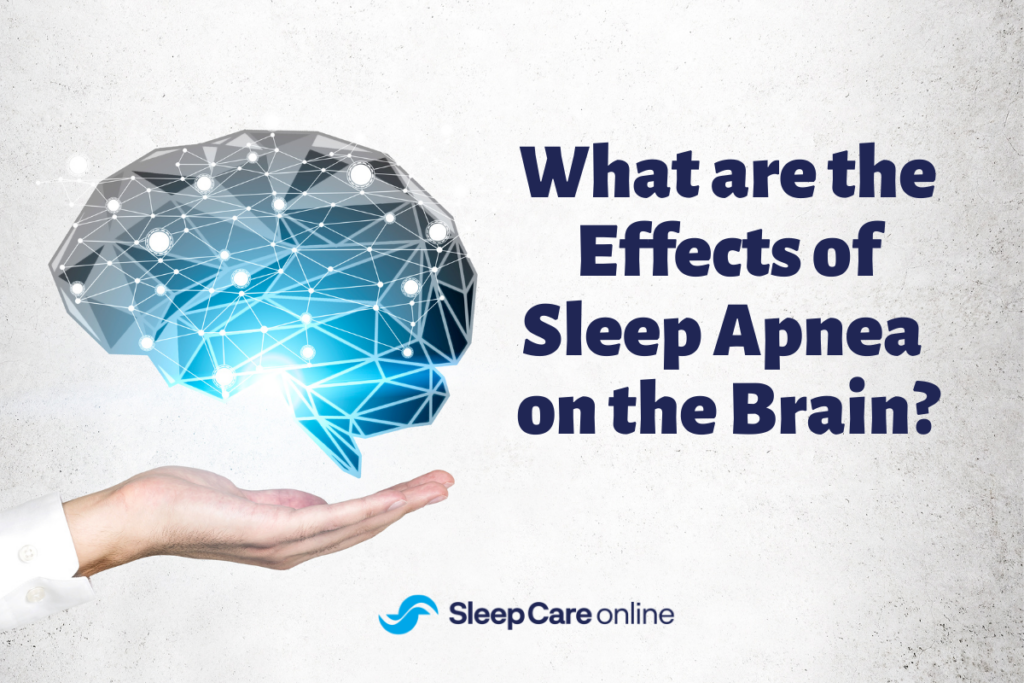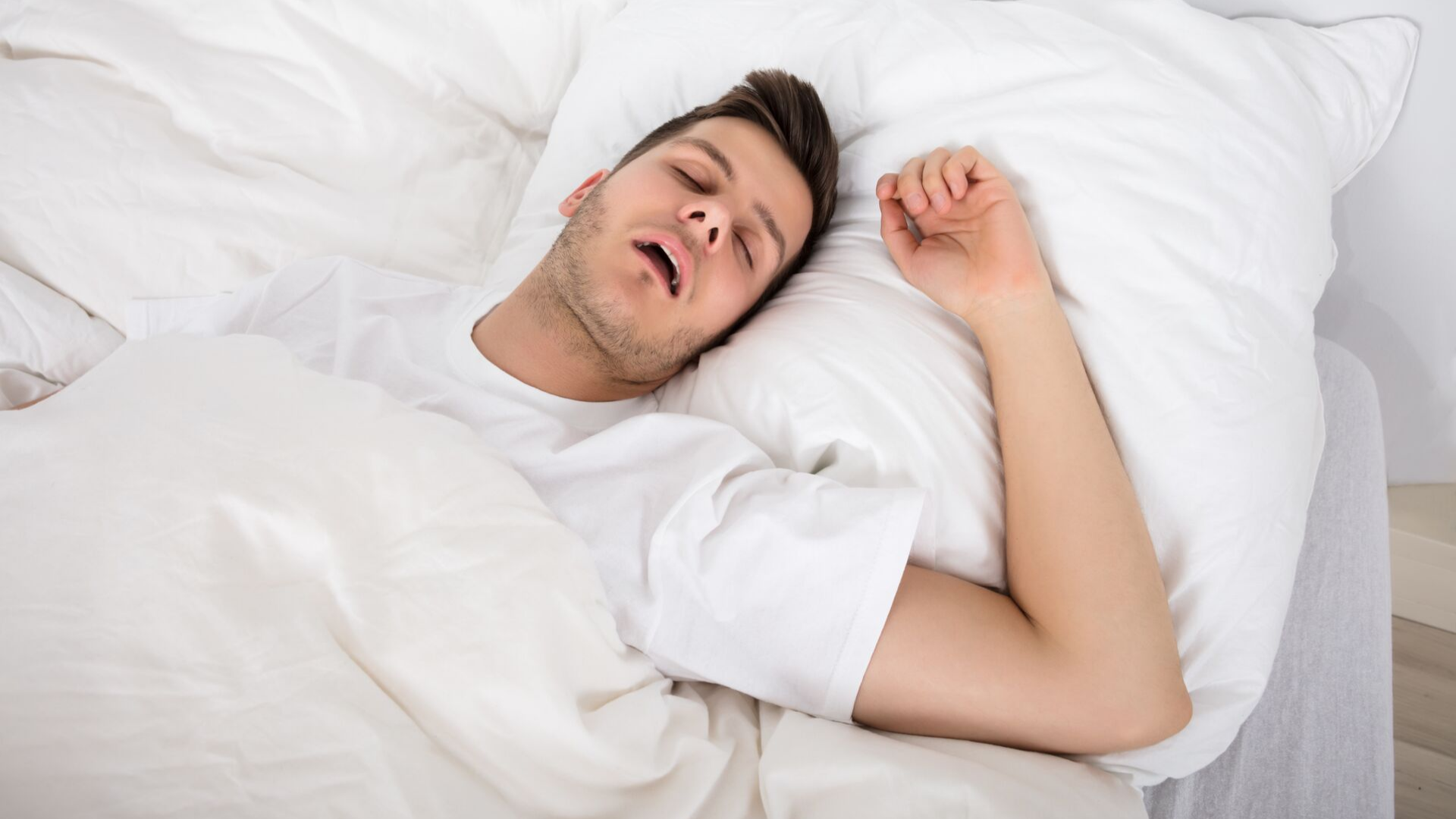Key Takeaways:
- Sleep is essential for survival and has many benefits for your health and well-being, including heart health, mental health, brain function, and more.
- If you have sleep apnea, it not only effects your quality of sleep, but also negatively effects many of the body’s daily functions.
- The impact of sleep apnea on brain health can be explored in this article.
Your problems with memory or concentration may not be due to aging but to lack of sleep. Poor sleep from sleep apnea impacts normal brain functions, affecting not only recall and focus but also emotions and even the shape of the brain itself.

Impact of Sleep Apnea on Brain Health
How Sleep Apnea Disrupts Neural Function
Normal sleep is defined by two phases: REM sleep and non-REM sleep. Both are controlled by the brain. We cycle through these phases about every 100 minutes. Sleep apnea disrupts these normal cycles. The brain cannot adapt to the erratic patterns of sleep apnea and normal brain functioning is affected both during sleep and while awake.
These disruptions not only affect neural function but also breathing patterns and oxygen levels. When breathing becomes erratic due to frequent apneas, less oxygen reaches the brain. Long-term, fragmented sleep causes cognitive impairment, problems with memory and mood swings.
Chronic Inflammation and Neurodegeneration
With reduced oxygen flow to the brain comes chronic inflammation. This inflammation can eventually cause breakdowns in the brain known as neurodegeneration. Most neurodegenerative diseases like Alzheimer’s, Parkinson’s, and dementia have a link to the sleep deprivation due to sleep apnea.
The Journal of the American Medical Association1 studies have discovered that those who did not have obstructive sleep apnea were less likely to develop cognitive problems related to neurodegenerative diseases.
The study concluded that disruptive sleep patterns long-term can cause neural dysfunction that can impact cognitive ability and eventually may lead to some neurogenerative problems.
Oxygen Deprivation: Unraveling the Effects on Brain Tissue
With reduced oxygen flow to the brain, due to sleep deprivation, brain function and brain tissue health are compromised. Oxygen is essential to the brain for managing energy metabolism and neuronal activity.
Long-term reduced oxygen leads to a condition known as hypoxia. This occurs when insufficient oxygen supply leads to tissue damage. For the brain the results can be alarming. When sleep apnea is left untreated for an extended period, patients risk white brain matter abnormalities, brain lesions, and cerebral atrophy.
Daytime Consequences and Cognitive Performance
Disturbed sleep is not the only result of sleep apnea. Daytime symptoms can reveal a brain that has not been properly restored with a good night’s sleep. Daytime drowsiness and chronic fatigue are signs of sleep deprivation due to sleep apnea. When the brain has not been restored with healthy sleep, concentration becomes impaired. The highest functions of the brain including decision-making are reduced.
Attention becomes short. Your ability to think quickly is dramatically slowed and the ability to solve even the most basic problems is impaired. Often simple cognitive assessments can become difficult for someone who is sleep deprived. Only with restorative sleep can you regain brain health and robust cognitive performance.
Creativity and Problem-Solving
Simply put, you need sleep to perform well in daily life. When put to more complex tasks involving work or creativity, a tired brain can hold you back. While a well-rested brain can think innovatively.
Often a good night’s sleep can produce the solution to a problem you have tried to solve while awake. “Sleeping on a problem” is a common technique for those who know the importance sleep plays in creative thinking and problem-solving.
Brain Health and Longevity
Sleep health does more than help you perform during the day; it can also help you live longer. Poor sleep can escalate brain age, leading to early cognitive decline as you get older. One key aspect of brain health is the glymphatic system, which helps remove waste to keep brain tissue healthy and to distribute biochemicals important to brain health including glucose, lipids and amino acids.
When the performance of the glymphatic system is impaired by poor sleep, the brain begins to lose its self-restorative properties.
Along with the proper treatment of sleep disorders, sleep health can be promoted with a consistent sleep schedule, avoiding alcohol close to bedtime and avoiding blue light stimulants like the TV, phone or computer before going to bed. Add to this a healthy diet and exercise and you can help keep your brain functioning better, longer.
How Is Sleep Apnea Related to Memory Loss?
Sleep apnea occurs when the airway temporarily closes while you sleep, causing you to gasp for air in the middle of the night and disrupting normal REM sleep. Over time, these apneas reduce oxygen flow to the brain, leading to brain dysfunction on the most fundamental level, including memory loss.
In a study with patients with Alzheimer’s disease, it was found that those with breathing problems were diagnosed with mild cognitive impairment an average of 10 years earlier than people without sleep breathing problems.
Learn about the relationship between sleep apnea and Alzheimer’s in this article.
Sleep Apnea Can Change the Shape of the Brain
That continual oxygen depletion during sleep starts to cause significant and measurable brain damage. Studies show that the brains of troubled sleepers were nearly 20% smaller than those without sleep issues.² In addition, the effects of sleep apnea on the brain are worsened by daytime fatigue that results from poor sleep.
Sleep Apnea Changes How the Brain Works
Along with shape, brain function begins to change as well as lower oxygen levels compel the brain to adapt chemically. Gamma-aminobutyric acid or GABA is a critical brain chemical for healthy brain function and communication between nerve cells. Sleep apnea reduces GABA, which can lead to anxiety mood disorders, and difficulty concentrating.
Is the Damage to the Brain Reversible?
The good news is that the effects of sleep apnea on the brain are not permanent. The use of CPAP therapy provides continuous airway pressure while sleeping, keeping the airway open and preventing apneas. This treatment for sleep apnea when strictly followed can improve sleep, increase oxygen flow to the brain, and reduce many of the harmful side effects of sleep apnea on brain function.
Cognitive and Psychological Consequences of Sleep Apnea
Patients diagnosed with obstructive sleep apnea demonstrate a decline in a wide spectrum of cognitive abilities, including memory, attention, psychomotor speed, and executive, verbal, and visual-spatial skills.
While a night of disrupted sleep may be inconvenient, the resulting daytime sleepiness can cause serious cognitive impairments. It reduces a person’s attention, as well as their learning and processing. A lack of sleep has also been found to induce effects that are similar to being drunk6, which slows down thinking and reaction time.
Just struggling to stay alert can, in itself, cause sweeping problems for thinking, but research also indicates that there are selective impacts of poor sleep on mental function. This means that insufficient or disrupted sleep causes more harm to certain parts of the brain with distinct effects on different types of cognition.
Is Mental Health Related to Sleep Apnea?
Sleep apnea also affects mental health, and those with sleep apnea have a far higher risk of anxiety, panic disorder, depression, bipolar disorder, or even schizophrenia.
It’s not surprising that sleep apnea can cause anxiety. Waking up repeatedly in the night feeling as if you’re choking or can’t breathe causes a stress response in the body and the brain. This can become a conditioned response and go on to affect many areas of your life. Daytime drowsiness, along with irritability, leads to problems at work, difficulty focusing, and relationship stress. You’re likely to feel anxious as your life spins out of your control.
Depression and sleep apnea could also be related. Those with depression often report trouble sleeping, and insomnia is one of the common symptoms of depression. Several other symptoms of sleep apnea, such as fatigue, daytime exhaustion, moodiness, poor focus, and weight gain, are also signs of depression.
Learn more about the link between mental health and sleep apnea.
A Study on Sleep and Cognitive Impairment
Science is just beginning to understand the value of sleep and how poor sleep can impact the brain. Studies are discovering the link between poor sleep and dementia and other forms of cognitive decline. 2 Evidence shows that good sleep positively impacts cognitive performance including attention, memory and learning. 3
Fortunately some case studies have found that a healthy sleep regimen can help reduce cognitive impairment. While not all cognitive impairment is sleep-related, better sleep can help improve cognitive function or at least slow cognitive decline in some cases related to neurogenerative disease. 4
Do you Have Sleep Apnea?
To know for sure if sleep apnea is affecting your brain health, you need to get an accurate diagnosis through a sleep study. While sleep studies can be conducted within a clinical environment, many prefer the home sleep test for its convenience. You can find more about home sleep tests from Sleep Care Online.
How Does a Home Sleep Apnea Test Work?
With the Complete Care Package, schedule a 10-minute telehealth visit with a healthcare provider to discuss your symptoms, upcoming sleep study, test results, and treatment options.
- A multi-night, disposable home sleep apnea test is mailed to your home to be completed at your convenience.
- A physician analyzes the sleep data and provides a prescription if needed.
- Schedule an optional follow-up appointment (additional fee applies).
- We connect you to sleep experts who can offer customized sleep therapy options, assistance in equipment purchase, and initial set-up.
References
- JAMA, Matthew P. Pase, PhD1,2,3; Stephanie Harrison, PhD4; Jeffrey R. Misialek, MPH5; et al Sleep Architecture, Obstructive Sleep Apnea, and Cognitive Function in Adults July 18, 2023.
- National Library of Medicine. Adam P. Spira, Lenis P. Chen-Edinboro, Mark N. Wu, and Kristine Yaffe Impact of Sleep on the Risk of Cognitive Decline and Dementia.
- Columbia University Department of Psychiatry. How Sleep Deprivation Impacts Mental Health March 16, 2022.
- Pharmaceuticals Sleep-Based Interventions in Alzheimer’s Disease: Promising Approaches from Prevention to Treatment along the Disease Trajectory March, 2021




